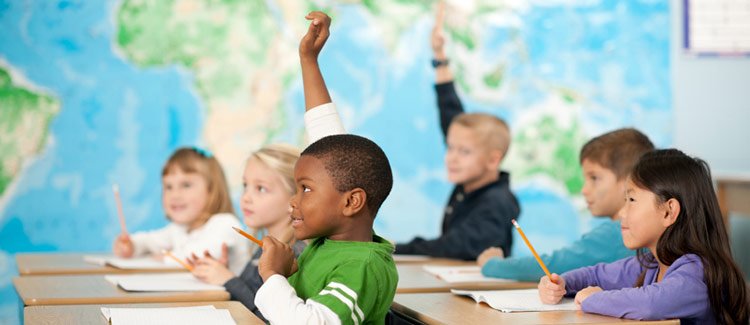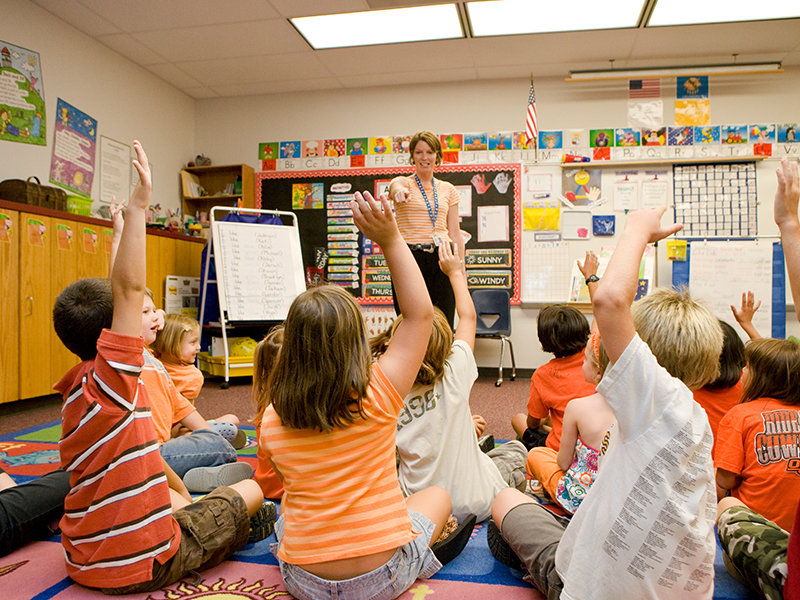Everything about Preschool: Comprehending the Relevance of Early Youth Education Programs
Preschool serves as an important phase in a youngster's early growth. It presents foundational abilities crucial for future discovering and social communications. Via various activities, kids involve in structured play that advertises cognitive growth. Recognizing the nuances of various preschool programs can further brighten their importance. What certain advantages do these early education and learning experiences provide, and just how do they shape a child's trajectory? The solutions might be a lot more complex than one may anticipate.

The Role of Kindergarten in Child Growth
Some might view kindergarten simply as a changeover stage prior to formal education, it plays an essential function in youngster development. This foundational stage fosters critical social, emotional, and cognitive skills that are crucial for long-lasting discovering. In preschool, kids take part in structured play, which boosts their capacity to comply, share, and solve disputes with peers. These interactions prepared for healthy and balanced partnerships and enhanced communication skills.
Furthermore, preschool introduces children to standard ideas in literacy and numeracy, triggering inquisitiveness and a love for discovering. Teachers lead pupils through tasks that advertise critical and analytic thinking, important parts of intellectual development. Furthermore, the environment stresses routine and structure, helping children develop self-control and independence. By concentrating on alternative growth, kindergarten guarantees that kids are not only ready academically however additionally socially and mentally for the challenges of future academic endeavors.
Secret Advantages of Very Early Youth Education
Early childhood education offers countless advantages that can considerably impact a youngster's development and future success. Research study indicates that kids that join quality very early education programs display boosted cognitive skills, far better language advancement, and improved social abilities compared to their peers that do not go to such programs. These fundamental skills are vital as they establish the phase for scholastic success and lifelong learning.
Early education and learning promotes psychological growth by giving youngsters with possibilities for cooperative play and conflict resolution, helping them develop resilience and empathy. Additionally, these programs commonly aid link the void for youngsters from varied histories, ensuring fair access to learning experiences and sources
Inevitably, purchasing very early childhood years education and learning not just benefits individual children but additionally adds to more powerful neighborhoods, as informed people are more probable to engage positively in society and the workforce.
Different Types of Preschool Programs
Numerous preschool programs satisfy different academic viewpoints and requirements. Full-day options offer prolonged knowing time, while the Montessori method emphasizes independence and hands-on experiences. In addition, play-based understanding approaches foster imagination and social skills, illustrating the diversity in very early childhood years education and learning.
Full-Day Kindergarten Options
Lots of parents and educators recognize the expanding value of full-day kindergarten alternatives in very early childhood education and learning. Full-day programs commonly supply a more comprehensive understanding experience, enabling children to take part in a range of activities throughout the day. These alternatives typically include a well balanced curriculum that incorporates academic, social, and psychological advancement. Some areas use conventional full-day kindergarten, while others might supply specialized programs, such as twin language or thematic discovering environments. In addition, full-day kindergarten can suit working parents by straightening institution hours with regular job timetables. Research study recommends that students in full-day programs commonly show improved scholastic efficiency and social skills contrasted to their peers in half-day settings, making these choices significantly popular in numerous areas.
Montessori Approach Summary
Although the Montessori strategy is just one of numerous instructional philosophies, it has acquired substantial focus for its unique emphasis on child-led knowing and expedition. Developed by Dr. Maria Montessori, this method concentrates on promoting self-reliance and self-directed task in youngsters. Class are typically developed to motivate activity and hands-on engagement with materials, enabling kids to discover at their own pace. Montessori teachers serve as guides, promoting learning through observation instead of straight guideline. This approach prioritizes mixed-age classrooms, promoting partnership and peer discovering. Furthermore, the Montessori technique highlights functional life skills and sensory activities, assisting kids establish a strong foundation in both academic and social expertises. Moms and dads typically appreciate the holistic development that this method nurtures in their children.
Play-Based Learning Strategies
Play-based understanding methods are essential to numerous preschool programs, highlighting the significance of play as a fundamental setting of why not find out more discovering for young kids. These strategies urge exploration, creativity, and social communication, allowing youngsters to involve in hands-on experiences that foster psychological and cognitive development. Numerous sorts of play, such as imaginative, positive, and physical play, are used to sustain discovering objectives throughout topics like math, scientific research, and literacy. Furthermore, play-based programs frequently include collaborative tasks, advertising teamwork and communication abilities. Educators observe and direct youngsters during play, making sure that finding out outcomes are accomplished while keeping a joyful knowing setting. This method not just boosts academic readiness however additionally cultivates a lifelong love for understanding, making it a vital part of very early childhood education.
The Value of Play in Understanding
A significant body of research highlights the important duty of play in early childhood education and learning, highlighting its extensive influence on knowing and advancement. Play functions as a crucial device whereby little ones explore their environment, establish cognitive abilities, and improve their analytical capabilities. Involving in creative play enables kids to explore various functions and situations, fostering creative thinking and critical thinking.
Play-based knowing encourages children to involve with products and ideas in a hands-on way, making abstract ideas much more easy to understand and concrete. This experiential knowing method not just records kids's interest yet also promotes inherent motivation, fundamental for long-lasting knowing.
Through play, youngsters also improve their electric motor skills and spatial recognition, preparing for more intricate academic jobs. Essentially, focusing on play in early childhood years education programs is vital for supporting holistic advancement, outfitting kids with the fundamental skills necessary for their future academic trips.
Social Skills Growth in Kindergarten
Structure on the structure established via play, kindergarten acts as a vital atmosphere for social abilities development. Throughout this formative stage, youngsters engage in structured tasks that encourage interaction with peers. Via group jobs, cooperative games, and shared jobs, they learn essential skills such as dispute, compassion, and interaction resolution.
Educators help with these communications, leading children in understanding social hints and cultivating favorable relationships. As kids browse numerous see this page social scenarios, they develop a sense of belonging and discover to value varied viewpoints.
Preschool gives possibilities for children to practice turn-taking, sharing, and settlement, which are necessary for constructing friendships. These experiences not only improve social capability yet additionally add to psychological knowledge. Because of this, the social abilities gotten in preschool prepared for effective communications in later instructional setups and throughout life. Consequently, the value of social abilities growth in preschool can not be overstated.
Adult Involvement in Early Education And Learning

Furthermore, when parents demonstrate a passion in their child's education, it grows a positive attitude towards knowing. Kids are a lot more most likely to create a feeling of he has a good point belonging and inspiration to prosper when they feel supported. Furthermore, parental participation can boost a kid's emotional well-being, bring about better durability in facing school obstacles. As a result, promoting a collaborative setting in between home and school is important for maximizing very early academic experiences and outcomes.
Preparing for the Shift to Elementary Institution
As children approach completion of their kindergarten trip, getting ready for the adjustment to elementary school ends up being progressively vital. This shift calls for cautious preparation and support from both parents and instructors. Familiarizing kids with the brand-new atmosphere, regimens, and expectations of elementary college can ease their anxiousness and advertise confidence.
Institutions frequently supply orientation sessions that introduce kids to their future class and teachers, promoting a feeling of belonging. Additionally, parents can take part in conversations concerning the changes ahead, highlighting the amazing opportunities for discovering and social communication.
Urging independence in daily tasks, such as clothing and adhering to a schedule, can additionally be valuable. Practicing important skills, such as letter recognition and fundamental mathematics, prepares youngsters academically for first grade.
Eventually, a joint initiative among parents, teachers, and the area ensures a smoother shift, laying a strong foundation for an effective educational journey.
Regularly Asked Questions
What Qualifications Should Kindergarten Teachers Have?
Kindergarten teachers should possess a bachelor's level in very early childhood years education and learning or a relevant area, in addition to state qualification. Added credentials might include specialized training in child development, classroom monitoring, and reliable training methods.
Exactly how Do I Select the Right Kindergarten Program?
To choose the right preschool program, one must think about elements like curriculum, training approaches, class size, educator credentials, and parent reviews. Visiting centers and observing interactions can also provide beneficial understandings into the program's setting.
What Should My Youngster Learn in Kindergarten?
In kindergarten, a youngster must learn fundamental abilities such as basic analysis and writing, counting, social communications, analytical, and motor abilities. These proficiencies foster cognitive growth and prepare them for future academic challenges.
Exist Age Requirements for Preschool Enrollment?
The majority of states need children to be 5 years of ages by a particular date, commonly September 1st, for preschool enrollment. Specific age demands can differ, so examining local institution area laws is important.
Exactly How Can I Assistance My Youngster's Learning in your home?
To sustain a youngster's understanding at home, parents can establish a regular, give interesting educational materials, encourage reading, join hands-on tasks, and foster open interaction to support inquisitiveness and critical thinking skills.
Kindergarten serves as a vital phase in a kid's very early growth. Some might watch preschool just as a transition stage prior to official education, it plays an essential role in kid growth. In addition, kindergarten presents youngsters to fundamental principles in proficiency and numeracy, triggering inquisitiveness and a love for learning. Play-based learning strategies are indispensable to countless preschool programs, highlighting the value of play as an essential mode of learning for young children. In preschool, a kid must learn foundational abilities such as fundamental reading and writing, counting, social interactions, problem-solving, and electric motor abilities.